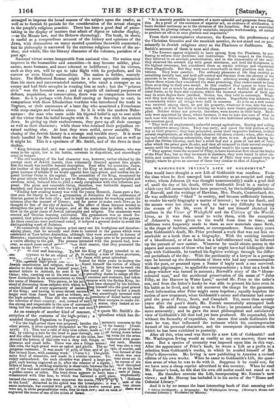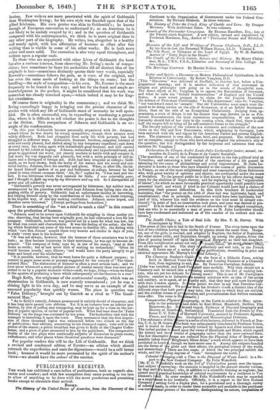WASHINGTON IRVING'S LIFE OF GOLDSMITH. * ONE would have thought a
new Life of Goldsmith was needless. From the time when he first emerged into notoriety as an essayist and ready writer, whom Johnson (it was thought unaccountably) made a good deal of, until the day of his death, Oliver Goldsmith lived in a society of which very full memorials have been preserved, by the indefatigable labour of Boswell, and the writings of Hawkins, Mrs. Thrale, Cumberland, &e. He was sufficiently " liked " in society, and became sufficiently famous, to render his early biography a matter of interest ; he was too frank, and the means were too close at band, to leave any difficulty in tracing the events of his life, even if he had not himself sketched its outlines in the Vicar of Wakefield and the Citizen of' the World. Lives, as it was then usual to write them, with the exception of Johnson's, were given to the world from time to time; and additions were frequently made to them as new materials came forth, in the shape of incident, anecdote, or correspondence. Some sixty years after Goldsmith's death, Mr. Prior produced a work that was not less remarkable as a book than as a biography. With the untiring instinct of a bloodhound, or of an Indian on a half-obliterated trail, he followed up the pursuit of new matter. Wherever he could obtain access to the papers and accounts of those who bad or might have had bibliopolie dealings with Goldsmith, he tracked his fugitive writings through the different periodicals of the day. With the pertinacity of a lawyer in a peerage case he hunted up the descendants of those who had any communication with the poet, or pounced upon a Nestor if haply such a one survived. He made pilgrimages; he applied for correspondence ; a hint on a book in a shop-window was turned to account; Boswell's story of the " bloomcoloured coat," and the accidental preservation of the name of "John Filby, at the Harrow in Water Lane," carried Mr. Prior to the tailor's son' and from the father's books he was able to present his hero even in his habit as he lived, and to tell moreover the charge for the garments. Fresh information after Prior might seem hopeless ; equally hopeless the notion of new treatment, when Goldsmith's career and character had occupied the pens of Percy, Scott, and Campbell. Yet, more than seventy years after the poet's death, Mr. Forster successfully attempted both tasks. He added some things even to Prior; he presented other things more accurately; and he gave the most philosophical and satisfactory view of Goldsmith's life that had yet been produced. He expounded, but without the formality of exposition, the causes that made Goldsmith the man he was, that influenced the estimate which his contemporaries formed of his personal character, and the consequent depreciation with which he has been exhibited to posterity.
After all this, what need was there for a new Life of Goldsmith? and Mr. Washington Irving would as readily as any one answer, there was none. But a species of necessity was imposed upon him in this way. After the appearance of Prior's book, be wrote a Life as a prefix to a selection from Goldsmith's works, in which he availed himself of Mr. Prior's discoveries. Mr. Irving is now publishing in America a revised edition of his own works. When he came to Goldsmith's Life, the question arose of what he was to do with it. Suppress it he could not, for we have seen a cheap reprint advertised in this country. When he read Mr. Forster's book, he felt that his own old notice could not stand as it was. He therefore rewrote the Life, incorporating Mr. Forster's new views ; and Mr. Murray has included it in his series of the "Home and Colonial Library." And it is by no means the least interesting book of that amusing col* Oliver Goldapilth; a Biography, By WashAngton Irvine. (Murray's Home and eMontat Library.) Published by Murray.
lection. Few writers are more penetrated with the spirit of Goldsmith than Washington Irving; for his own style was founded upon that of the gifted Irishman. His own genius was akin to Goldsmith's ; he knows enough of European convention to understand it ; as an American he is not likely to be unduly swayed by it ; and in the question of Goldsmith compared with his contemporaries, we think he is more original than in any other part of the biography. He writes, too, altogether in a healthy and manly spirit, with less affectation of humour or effort after fine writing than is visible in some of his other works. He is both more sober and more solid. The execution is also very equal throughout, and written upon a regular scale.
To those who are acquainted with other Lives of Goldsmith the book has also a curious interest, from observing Mr. Irving's mode of composition; how sometimes he fuses his authorities till all distinct idea of the originals is lost—sometimes distinctly quotes their very words, especially Boswell's—sometimes follows the path, as it were, of the original, and has even the same mode of looking at the things en route; but the handling—the style of composition—is his own. Mr. Forster is the most frequently to be traced in this way ; and but for the frank and ample acknowledgment in the preface, it might he considered that his work was somewhat too closely trenched upon,—which indeed it may be for English circulation.
Of course there is originality in the commentary ; and we think Mr. Irving exceedingly happy in bringing out the precise character of the stories with which any life of Goldsmith must of necessity be well sprinkled. He is often successful, too, in expanding or condensing a general idea, where it is difficult to tell whether the praise is due to the thoughts or the diction. This comparison of Johnson and Goldsmith is an example of the condensation.
'‘In this year Goldsmith became personally acquainted with Dr. Johnson ; toward whom he was drawn by strong sympathies, though their natures were widely different. Both had struggled from early life with poverty, but had struggled in different ways. Goldsmith, buoyant, heedless, sanguine, tolerant of evils and easily pleased, had shifted along by any temporary expedient; cast down at every turn, but rising again with indomitable good-humour, and still carried forward by his talent at hoping. Johnson, melancholy and hypochrondriacal, and prone to apprehend the worst, yet sternly resolute to battle with and conquer it, had made his way doggedly and gloomily, but with a noble principle of self-reliance and a disregard of foreign and. Both had been irregular at college ; Goldsmith, as we have shown, from the levity of his nature and his social and convivial habits; Johnson, from his acerbity and gloom. When, in after life, the latter heard himself spoken of as gay and frolicsome at college, because he had joined in some riotous excesses there, • Ah, Sir !' replied he, was mad and violent. It was bitterness which they mistook for frolic. I was miserably poor, and I thought to fight my way by my literature and my wit. So I disregarded all power and all authority.' "Goldsmith's poverty was never accompanied by bitterness; but neither was it accompanied by the guardian pride which kept Johnson from falling into the degrading shifts of poverty. Goldsmith had an unfortunate facility at borrowing, and helping himself along by the contributions of his friends; no doubt trusting, in his hopeful way, of one day making retribution. Johnson never hoped, and therefore never borrowed." [Except perhaps from booksellers.]
There is something of the "set a thief to catch a thief" in this remark upon the production of humour.
Johnson used to be severe upon Goldsmith for mingling in these motley circles; observing, that having been originally poor, he had contracted a love for low company. Goldsmith, however, was guided not by a taste for what was low, but for what was comic and characteristic. It was the feeling of the artist; the feeling which furnished out some of his best scenes in familiar life; the feeling with which 'rare Ben Janson' sought these very haunts and circles in days of yore, to study every man in his humour.'
"It was not always, however, that the humour of these associates was to his taste ; as they became boisterous in their merriment, he was apt to become depressed. The company of fools,' says he, in one of his essays, may at first make us smile ; but at last never fails of making us melancholy.' Often he would become moody,' says Glover; 'and would leave the party abruptly to go home and brood over his misfortune.'
"It is possible, however, that he went home for quite a different pnrpose; to commit to paper some scene or passage suggested for his comedy of The Goodnatured Man.' The elaboration of humour is often a most serious task; and we have never witnessed a more perfect picture of mental misery than was once presented to us by a popular dramatic writer—still, we hope, living—whom we found in the agonies of producing a farce which subsequently set the theatres in a roar:,
Hugh Kelly, the originator of the sentimental comedy, which was an abomination to Goldsmith, is now scarcely remembered ; yet he was a shining light in his own day, and he may serve as an example of the unsound popularity that quickly wanes. The piece in question was "False Delicacy," brought out by Garrick as a rival to "The Goodnatured Man."
"As to Kelly's comedy, Johnson pronounced it entirely devoid of character; and it has long since passed into oblivion. Yet it is an instance how an inferior production, by dint of puffing and trumpeting, may be kept up for a time on the surface of popular opinion, or rather of popular talk. What had been done for 'False Delicacy' on the stage was continued by the press. The booksellers vied with the manager in launching it upon the town. They announced that the first impression of three thousand copies was exhausted before two o'clock on the day of publication; four editions, amounting to ten thousand copies, were sold in the course of the seasona public breakfast was given to Kelly at the Chapter Coffeehouse, and a piece of plate presented to him by the publishers. The comparative merits of the two plays were continually subjects of discussion in green-rooms, coffeehouses, and other places where theatrical questions were discussed."
For popular readers this will be the Life of Goldsmith. But we think a revised and condensed edition of Forster—an edition which should retrench the superfluities and omit the digressions—would boa still better book ; because it would be more permeated by the spirit of the author's views—we should have the colour of the current.

























 Previous page
Previous page